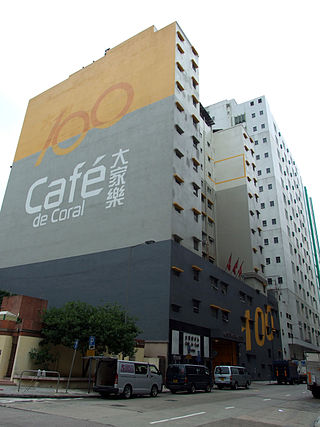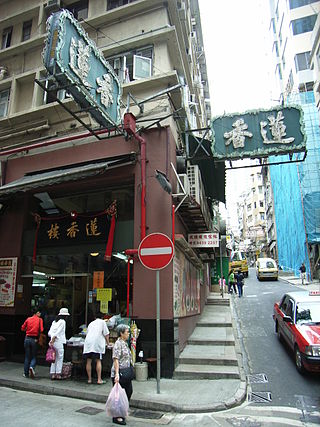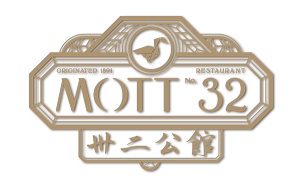
Dim sum is a large range of small Chinese dishes that are traditionally enjoyed in restaurants for brunch. Most modern dim sum dishes are commonly associated with Cantonese cuisine, although dim sum dishes also exist in other Chinese cuisines. In the tenth century, when the city of Canton (Guangzhou) began to experience an increase in commercial travel, many frequented teahouses for small-portion meals with tea called "yum cha" (brunch). "Yum cha" includes two related concepts. The first is "jat zung loeng gin", which translates literally as "one cup, two pieces". This refers to the custom of serving teahouse customers two delicately made food items, savory or sweet, to complement their tea. The second is dim sum, which translates literally to "touch the heart", the term used to designate the small food items that accompanied the tea.

Manhattan's Chinatown is a neighborhood in Lower Manhattan, New York City, bordering the Lower East Side to its east, Little Italy to its north, Civic Center to its south, and Tribeca to its west. With an estimated population of 90,000 to 100,000 people, Chinatown is home to the highest concentration of Chinese people in the Western Hemisphere. Manhattan's Chinatown is also one of the oldest Chinese ethnic enclaves. The Manhattan Chinatown is one of nine Chinatown neighborhoods in New York City, as well as one of twelve in the New York metropolitan area, which contains the largest ethnic Chinese population outside of Asia, comprising an estimated 893,697 uniracial individuals as of 2017.
The tea-drinking habits of Hong Kong residents derive from Chinese tea culture, primarily the Cantonese traditions such as yum cha. Because of Hong Kong's period as a British colony, Hong Kong tea culture is distinct from the tea culture of the mainland. The uniqueness of its tea culture applies both to the tea itself, and also the underlying social and cultural values.

Cha chaan teng, often called a Hong Kong-style cafe or diner in English, is a type of restaurant that originated in Hong Kong. Cha chaan tengs are commonly found in Hong Kong, Macau, and parts of Guangdong. Due to the waves of mass migrations from Hong Kong in the 1980s, they are now established in major Chinese communities in Western countries such as Australia, Canada, the United Kingdom, and the United States. Likened to a greasy spoon cafe or an American diner, cha chaan tengs are known for eclectic and affordable menus, which include dishes from Hong Kong cuisine and Hong Kong-style Western cuisine. They draw comparisons to Western cafés due to their casual settings, as well as menus revolving around coffee and tea.

Café de Coral Holdings, Ltd. is a Hong Kong fast-food restaurant group that owns and operates fast-food chains and restaurants, including Café de Coral, Super Super, The Spaghetti House, Oliver's Super Sandwiches, Ah Yee Leng Tong, and others.

Hong Kong cuisine is mainly influenced by Cantonese cuisine, European cuisines and non-Cantonese Chinese cuisines, as well as Japanese, Korean and Southeast Asian cuisines, due to Hong Kong's past as a British colony and a long history of being an international port of commerce. Complex combinations and international gourmet expertise have given Hong Kong the labels of "Gourmet Paradise" and "World's Fair of Food".

Hong Kong–style milk tea, also known as "silk-stocking" milk tea (絲襪奶茶), is a tea drink made from Ceylon black tea and evaporated milk. The drink originated in the mid-20th century during the British rule of Hong Kong, and was inspired by the British's afternoon tea.

Canadian Chinese cuisine is a cuisine derived from Chinese cuisine that was developed by Chinese Canadians. It was the first form of commercially available Chinese food in Canada. This cooking style was invented by early Cantonese immigrants who adapted traditional Chinese recipes to Western tastes and the available ingredients, and developed in a similar process to American Chinese cuisine.

During the British colonial era, English was the sole official language until 1978. Today, the Basic Law of Hong Kong states that English and Chinese are the two official languages of Hong Kong. All roads and government signs are bilingual, and both languages are used in academia, business and the courts, as well as in most government materials today.

Mott Street is a narrow but busy thoroughfare that runs in a north–south direction in the New York City borough of Manhattan. It is regarded as Chinatown's unofficial "Main Street". Mott Street runs from Bleecker Street in the north to Chatham Square in the south. It is a one-way street with southbound-running vehicular traffic only.

Maxim's Caterers Limited is a Hong Kong–based food, beverage and restaurant chain jointly owned by Dairy Farm International Holdings Limited and Hong Kong Caterers Ltd.

Forum Restaurant is a Cantonese restaurant officially established in 1977. It is located at Sino Plaza, Causeway Bay, Hong Kong since 2014. Run by Hong Kong's international chef and ambassador of Chinese cuisine, Yeung Koon-yat (楊貫一), it is known for its expensive abalone dishes.

The first Brooklyn Chinatown, was originally established in the Sunset Park area of the New York City borough of Brooklyn. It is one of the largest and fastest growing ethnic Chinese enclaves outside of Asia, as well as within New York City itself. Because this Chinatown is rapidly evolving into an enclave predominantly of Fuzhou immigrants from Fujian Province in China, it is now increasingly common to refer to it as the Little Fuzhou or Fuzhou Town of the Western Hemisphere; as well as the largest Fuzhou enclave of New York City.

Goods of Desire commonly known as G.O.D., is a lifestyle design and retail brand based in Hong Kong. Founded in 1996 by Douglas Young, the brand is known for its tongue-in-cheek interpretation of Hong Kong design and culture. The English name 'G.O.D.' is a homophonic translation of the Cantonese "住好啲", which roughly translates as "to live better".
Michelle Anne Garnaut, is an Australian restaurateur and cook best known for her series of restaurants in China including M on the Bund, Glam, Capital M, the Glamour Bar and M at the Fringe. Garnaut is also a founder of the Shanghai International Literary Festival, the M Literary Residency, the Village People Project and has spearheaded Mentor Walks in both Beijing and Shanghai. In 2018, Garnaut was awarded an Order of Australia (AO) for her work.

Tim Ho Wan is a Hong Kong dim sum restaurant chain originating from Hong Kong. Known for being "the world's cheapest Michelin-star restaurant", the chain has since expanded and now has franchises in 12 countries.
Yenn Wong is a Singaporean restaurateur who is the CEO and Founder of the Hong Kong–based JIA Group which runs 12 restaurants across Hong Kong.

Mott 32 is a Cantonese restaurant owned by Maximal Concepts. As of 2024, Mott 32 has eight locations, including Hong Kong, Las Vegas, Vancouver, Bangkok, Singapore, Seoul, Dubai and Cebu.

The yellow economic circle, also known as the yellow economy, is a form of consumer activism in Hong Kong, in which businesses are classified based on their support or opposition to the 2019–2020 protests in the city. It was created by protesters to enable dollar voting and support like-minded businesses, sustain the livelihoods of pro-democracy business owners, create job opportunities for supporters of the movement, and reduce local dependence on businesses that are connected to the Chinese Communist Party. Local political analysts suggested that the yellow economic circle could have increased votes for the pro-democracy camp in the Catering, Wholesale, and Retail functional constituency in the later postponed 2020 legislative election.















